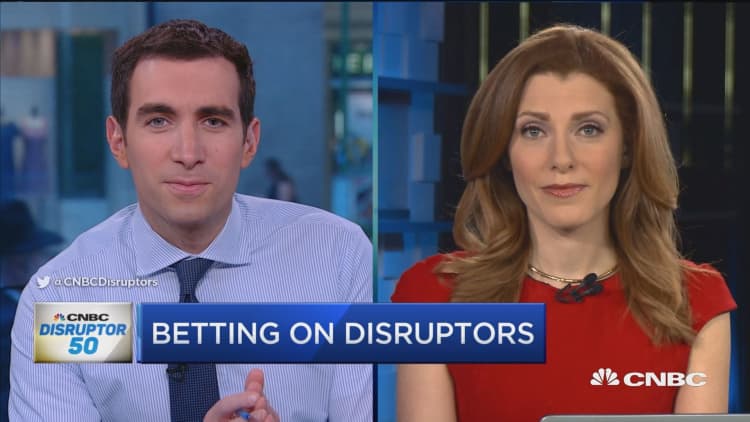
Disruption. There are conferences, newsletters, books and podcasts about that word, trying to capitalize on our cultural obsession with shaking up the status quo. The term "disruption" has become so overused as a proxy for a "cool Silicon Valley idea" that it's become cliche. But truly disruptive companies are as powerful as ever, challenging established industries or building entirely new ones. And executing a truly disruptive idea may actually be more possible than ever, thanks to the advent of new tools for entrepreneurs.
The fact that the idea of disruption has become so ubiquitous is actually a good thing, said Greylock Partners' Jerry Chen: "I think it does create this spirit or aspiration of what start-ups should shoot for."
Kleiner Perkins' Eric Feng also said he loves the word: "It's synonymous for us with innovation. If there's something worth inventing, you're probably solving a problem that a lot of people wanted to solve, so you have to go after and disrupt the incumbent."
Y Combinator partner Dalton Caldwell, a former serial entrepreneur, avoids the word. "It's possible after the fact to see that something's disruptive, but it's really hard to do on purpose. ... It can sometimes lead you in the wrong direction," he said.
Spotting disruption
"We believe that the next couple of decades will bring more disruption across the board," said Yuri Milner, whose DST Global fund has backed such giants as Facebook, Chinese mobile phone maker Xiaomi, Spotify and Twitter. Now Milner is focused away from purely digital companies to those that combine online and offline, like his investment Flipkart, in India. And the earlier in their life cycles the companies are that he invests in, the more important he said it is to take a portfolio approach: "The founders themselves don't really know if they're going to succeed or whether they have the qualities necessary for success."
Greylock's Chen argued that with all the technological innovations with the cloud, mobile and artificial intelligence, incumbents in every industry are particularly vulnerable to disruption. "Incumbents can be victims of their own business model, of their own success." And that's what Chen and his partners at Greylock are looking to capitalize on. "We start with a founder that has a vision about an industry or a market and how they're going to change it, and then we match that with a market we think could be disruptive, that's large, growing fast and is ready for change," said Chen. "That combination of a founder and a market — when they collide, they create this perfect storm."
In addition to focusing on founders and the market, Feng and his colleagues at Kleiner are also focused on timing. "Could this company have existed five years earlier? The hope is that five years earlier the market conditions weren't ready for this — not enough adoption of a certain technology or not enough infrastructure to support what they're trying to do, and therefore that's why it needs to exist now," said Feng. "We're more often worried about whether an idea is too early. If you go too early, you put money and resources into proving out a market for someone else to come in and eventually win behind you."
What lies ahead?
The market that has enabled so many disruptive technologies — from Uber shaking up transportation to Spotify changing the way we listen to music — is changing. Smartphone sales are slowing for the first time in many years, indicating that the explosion of devices that's created such a massive platform for so many apps can't be depended on to sustain that growth engine for start-ups.
And there's been a dearth of IPOs; the lowest number of companies since the last recession threatens the flow of capital into start-ups. "There are going to be areas that we can't just count on the macro [climate] lifting those companies up. We have to be really surgical and thoughtful in what we invest in," said Kleiner's Feng. "But at the same time, I've never been more excited by the number of interesting opportunities out there from space, augmented and virtual reality, artificial intelligence, conversation interfaces, health care."
Y Combinator's Caldwell noted that the current wave of disruptive companies seemed like terrible ideas. "Doing a ride app that competes with taxis — that didn't seem super appealing; it seemed small and inconsequential," he said. "Airbnb? It seemed like no one would want to pay to sleep on someone's airbed."
"The next big things will be different," said Caldwell. Predicting what areas will be big in five or 10 years, Caldwell points away from the mobile and app space to technology disrupting health care, insurance and cancer treatment.
Elon Musk, who is literally shooting for the stars with his investments in colonizing Mars and bringing electric cars mainstream, is hopeful that entrepreneurs will focus their energy on the biggest issues facing humanity. "I think there is a lot of innovation going on. I think there's probably a few too many talented entrepreneurs in the Internet space," said Musk. "I think it would be better to have some of that talent in other industries."
Caldwell agreed that disruptive technologies are having a net positive on the world. "Look at increased access to the Internet, while it's leading to more people getting involved with really negative stuff, it's net positive," he said. "Take mobile payments in Africa, where people who don't have regular Internet access can do mobile payments everywhere."
And key for so many venture investors is finding those disruptive technologies that can create all sorts of value. "I'm a huge believer that disruptive technologies are going to do amazing things for the world," said Feng. "The key here is that doing right by the world and generating returns as an investor, we don't view those as mutually exclusive but as achieving the one goal, which is to create value."






